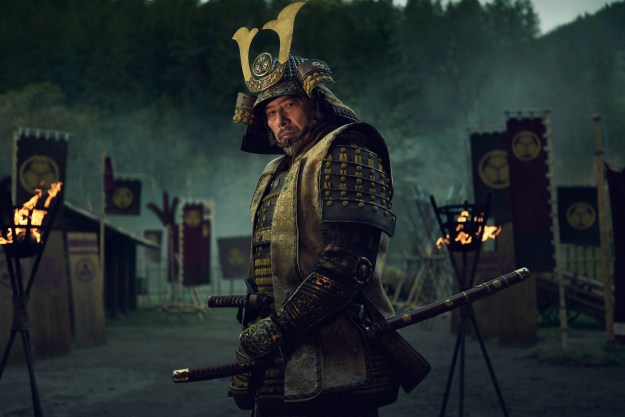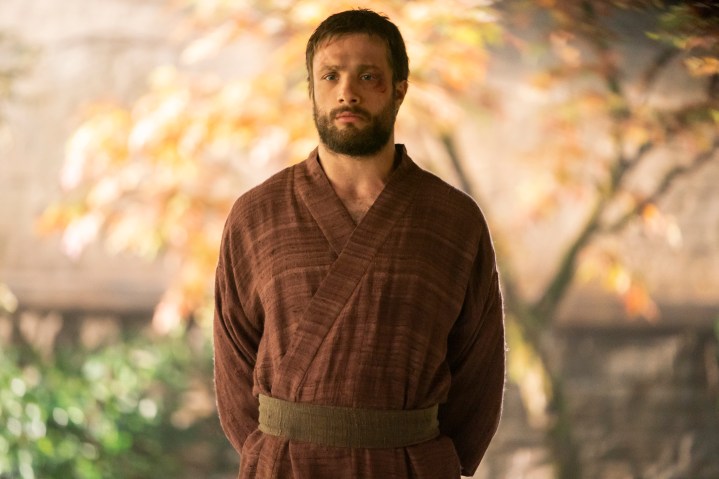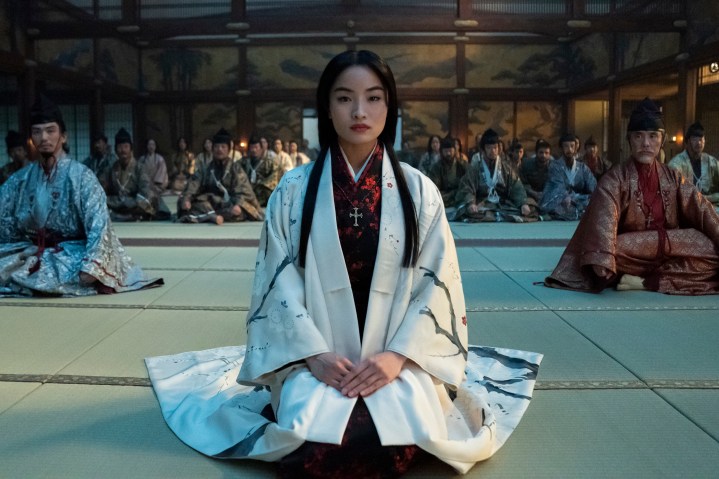
“FX's Shōgun is a visually breathtaking historical epic that will keep you consistently engaged across its 10 ambitious, densely plotted episodes.”
- Hiroyuki Sanada's powerful, nuanced lead performance
- Visually breathtaking, period-accurate sets and locations throughout
- A well-researched, subversive story of honor and power set in 1600s Japan
- A plot that is, at times, too intricate for its own good
- An anti-climax in its finale that may prove frustrating to some
Shōgun is a fascinating thing. An adaptation of James Clavell’s 1975 novel of the same name, which was previously adapted into a TV miniseries starring legendary Japanese movie star Toshiro Mifune in 1980, FX’s latest offering is an entrancing blend of older and modern influences. Narratively and financially, the series is built with the same sturdiness and sweeping scope as the kind of grand cinematic epics that Hollywood was once known for. At the same time, Shōgun is expensive, violent, and occasionally erotic in ways that have only become truly possible on television in our current, post-Game of Thrones world.
In less careful hands, Shōgun could have been a mess — an off-putting and confusing combination of conflicting tones and creative impulses. Its many moments of nudity and brutality, when combined with its clearly costly budget and the white-savior elements of its story, could have easily made Shōgun a tedious, indulgent, and culturally insensitive disaster. Instead, what has arrived on our television screens just two months into the year is a frequently astonishing historical drama. Like all great epics, it beautifully rides the line between prestige solemnity and engaging watchability, emerging as a 10-episode political thriller that is equal parts compelling and entertaining.

Based loosely on the adventures of real-life navigator William Adams, who became the first Englishman to reach Japan in the 1600s, Shōgun follows John Blackthorne (Cosmo Jarvis), a British protestant intent on decreasing the influence of Portuguese Catholics throughout the world. When he successfully pilots himself and the few surviving crewmembers of his British sailing vessel to the shores of Japan, he quickly becomes a prisoner of the country’s native warriors. Before long, he is presented to Yoshii Toranaga (Hiroyuki Sanada), a formidable feudal lord whose life and position have recently come under attack from his fellow scheming Japanese regents, who are led by the prideful Ishido Kazunari (Takehiro Hira).
Rather than executing Blackthorne, Toranaga recruits him to his cause — offering him comfortable accommodations in exchange for his information and aid. He partners Blackthorne up with a translator in the form of Toda Mariko (Anna Sawai), a Japanese Catholic who is desperate to demonstrate her commitment to Toranaga, avenge her late father, and also relieve herself of the burden caused by the shame attached to her family name. The more time they spend together, the more romantically attracted Mariko and Blackthorne become to each other. However, the cultural differences that exist between them — namely, Blackthorne’s frustration over Mariko’s complete disinterest in his Western-based ideas regarding her personal freedom — emerge as frequent stumbling blocks for both.
On paper, Shōgun‘s plot makes it seem like yet another entry into the canon of white savior stories set in Asian countries. By beginning with Jarvis’ Blackthorne, it looks, at first, like the series may even make the mistake of going down that unfortunate road. It doesn’t take long for Shōgun to show that it’s smarter than that, though. The miniseries avoids becoming its worst possible self by not only repeatedly spotlighting the ugliness of Blackthorne and his colonialist beliefs but also by going out of its way to reinforce the agency and intelligence of its Asian characters. At no point in Shōgun does it seem like Toranaga or Mariko are simply tools in Blackthorne’s story. The opposite seems true more often than not, and that allows Shōgun to strip Blackthorne’s inevitable journey of cultural assimilation of whatever unnerving romanticism it might have otherwise had.

The series, which comes from creators Rachel Kondo and Justin Marks, embraces the morally ambiguous nature of its story even more fully than many of its high-profile Prestige TV contemporaries, including HBO’s Thrones and its 2022 spin-off, House of the Dragon. The drama never shies away from its characters’ moments of selfishness or unbridled ambition, and yet it refuses to ever cast any straightforward judgments on them. Even Sanada’s Toranaga, who is set up and painted to be a legendary figure in the eyes of his followers, is shown to be too cunning, power-hungry, and stubborn to pass as a traditionally heroic lead. Shōgun swims in the murkiest moral waters that it can. In doing so, it can deftly ruminate on how seemingly immovable notions of honor and strength can shift and evolve depending on one’s culture.
The show’s exploration of such matters works as well as it does partly due to how well-researched it is and how well it balances the perspectives of its Japanese and white characters. It’s also thanks, in no small part, to the performances given by its cast. Anna Sawai brings both a quiet grace and a perpetually simmering sense of determination to her turn as Mariko, who reveals herself to be a powerful counter to Cosmo Jarvis’ Blackthorne, whose gravelly voice and ill-mannered behavior make him stand out all the more in Shōgun‘s version of pre-Edo period Japan. Opposite them, Tadanobu Asano and Néstor Carbonell respectively shine as Kashigi Yabushige and Vasco Rodrigues as well, a pair of similarly charismatic figures who are less governed by their socially accepted rules of honor and more by their survival instincts.
Ultimately, Shōgun is anchored by Hiroyuki Sanada, the esteemed Japanese actor who has grown increasingly recognizable to stateside viewers since he gave his international breakout performance in 2003’s The Last Samurai. Here, he gets arguably his greatest Hollywood role to date in Yoshii Toranaga, a character whose pride is matched by his wit and whose will proves to be truly unbending. Sanada has always been uniquely gifted at portraying honorable figures, but Shōgun gives him the chance to add new layers to the kind of archetypal characters he’s often asked to play. His Toranaga may be just as commanding and capable as anyone familiar with the actor’s work will expect, but he’s also gradually revealed to be more playful and mercenary than he lets on, and Sanada balances all of his character’s many sides with astounding ease.
The splendor of Shōgun‘s sets and locations match the strength of its performances and scripts, as do its period-accurate costumes and sets. The series undoubtedly cost quite a lot to make, but unlike so many of the blockbuster TV shows produced nowadays, one gets the sense that Shōgun was actually made by a creative team that knew how to use its budget effectively. The sheer scale of its storytelling is enough to make up for the exceedingly, sometimes confusingly, intricate nature of its plot. Shōgun is, by no means, an easy series to keep up with. Its cast of characters is large, and the political machinations at work in each of its episodes force one to pay close attention at all times. If you don’t, you may very well find yourself confused about who is an ally to whom and what certain characters’ goals are at different times.
That fact, along with its final episodes’ lower number of set pieces, may make Shōgun too densely plotted of an experience for some. Those who are willing to put as much into Shōgun as the show demands will, however, find themselves rewarded with a series that neither takes their time for granted nor underestimates their intelligence. It adopts a patient, detail-oriented approach to its plot — proving to be the rare, ultra-sized TV drama that knows when to hold and when to attack. It’s a samurai epic that cuts deep.
The first two installments of Shōgun premiere Tuesday, February 27, on FX and Hulu. New episodes release weekly. Digital Trends was given early access to all 10 of the series’ episodes.



